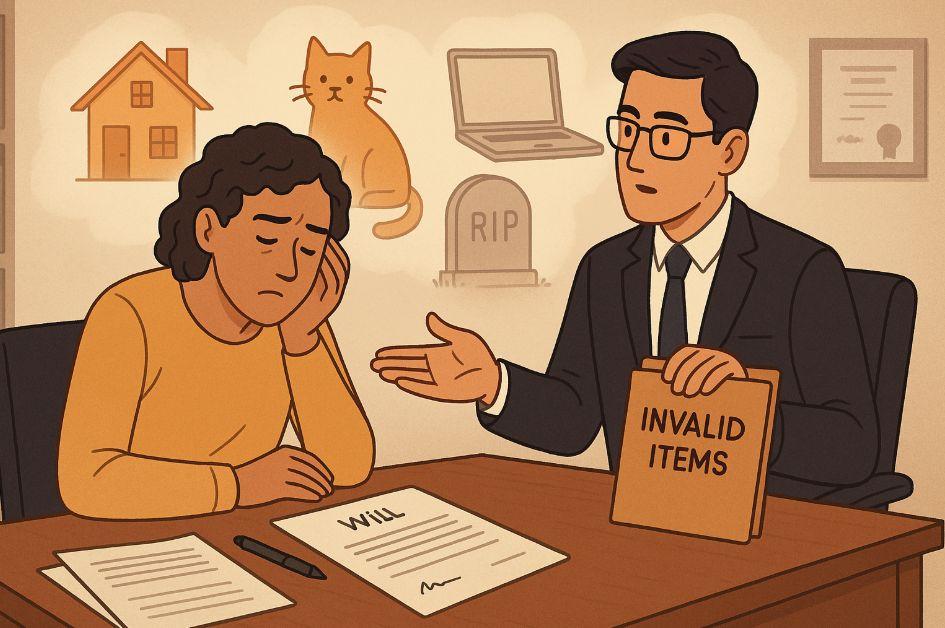In the United Kingdom, making a will is a critical part of estate planning. A will empowers individuals to specify how their possessions should be allocated, who should look after their dependants, and how they wish to be remembered after death. However, despite best intentions, many people make serious mistakes by including things that either don’t belong in a will or could even invalidate the entire document.
This article explores which items should be excluded from a UK will and discusses the legal and practical consequences of adding inappropriate content. Whether you’re drafting your first will or reviewing an existing one, understanding these 10 crucial mistakes can help protect your wishes and provide peace of mind for your loved ones.
Why Is It Important to Know What Not to Include in a UK Will?

The Legal Limits of Testamentary Freedom
In the UK, the principle of testamentary freedom allows you to distribute your estate however you choose. But that freedom isn’t absolute. There are legal restrictions on what can and cannot be included in a will especially when it conflicts with statutory rights or public policy.
Common Misunderstandings That Lead to Invalid Wills
Many people assume they can use a will to express all their wishes, no matter how specific or emotional. This leads to issues when the document contains unenforceable or irrelevant instructions, making parts of the will void or contested.
Why Legal Clarity Protects Your Estate and Heirs
A properly drafted will avoids misinterpretation, speeds up probate, and reduces the risk of family disputes. By keeping only appropriate clauses in the will and using other documents for non-legal matters, you increase the likelihood that your estate will be distributed smoothly.
Can Funeral Instructions Be Legally Enforced Through a Will?
Timing Issues with Probate
Funeral instructions written in a will are often discovered too late. Executors may not read the will until after the funeral has taken place, rendering your preferences irrelevant.
What Is a Letter of Wishes?
A letter of wishes is a non-legally binding document you can prepare alongside your will to offer personal guidance to family members or executors.
While not legally binding, it ensures your funeral preferences are known and considered.
What Should Be Included in a Letter of Wishes?
Typical items include your desired burial or cremation method, religious preferences, music, readings, and people to notify. This document can be stored alongside your will, but should not replace it.
Should You Include Jointly Owned Property in Your Will?

Understanding Joint Tenancy vs Tenants in Common
In joint tenancy, the surviving co-owner automatically inherits the property, so your share cannot be passed on through your will. In contrast, if you own property as tenants in common, your share can be left to a chosen beneficiary.
Why Joint Property Can Cause Confusion
Including jointly owned property in a will when it legally passes outside of the will can create confusion and false expectations among beneficiaries, potentially leading to legal challenges.
The Importance of Checking Your Property Title
To avoid problems, it’s essential to confirm how your property is held. If changes are needed, you can legally convert joint tenancy into tenants in common through a severance process.
Is It a Mistake to Include Life Insurance Policies in a Will?
The Role of Beneficiary Designations
Life insurance payouts typically go directly to the named beneficiaries on the policy. If you mention a different person in your will, it won’t override the policy creating inconsistency and possible disputes.
Tax Implications and Delays
Naming your estate as the beneficiary of a life insurance policy (by default or intention) may lead to unnecessary inheritance tax and delays in payout, as the funds will be tied up in probate.
When You Should Update Life Insurance Details
It’s advisable to revisit your life insurance beneficiary details after major life events such as getting married, going through a divorce, or welcoming a new child. Always ensure they match your overall estate planning intentions.
What Happens If You Leave Gifts for Pets in a UK Will?
Legal Status of Animals in the UK
Pets are legally classified as property under UK law, meaning they cannot own or inherit assets. If you try to leave an inheritance directly to your pet, that clause won’t be legally valid under UK law.
Assigning a Pet Guardian
Your will can appoint someone you trust to care for your pet, along with a financial provision intended to support the pet’s future needs. This person is not legally obliged to use the funds as instructed unless a formal pet trust is created.
Setting Up a Pet Trust
A pet trust is a legal mechanism where funds are set aside for the care of your animal. You appoint a trustee who ensures the money is used exclusively for pet welfare adding a level of legal enforceability.
Can You Leave Conditional or Illegal Gifts in Your Will?
What Are Conditional Gifts?
These are gifts that depend on a condition being met (e.g., a beneficiary must graduate university to receive their inheritance). While legal in theory, they can cause problems if they’re vague, unlawful, or impractical.
Examples of Unenforceable Conditions
Conditions that require someone to divorce, marry a specific person, change religion, or act unethically are not upheld by UK courts. In some cases, the inclusion of such terms might result in that section of the will being disregarded altogether.
Better Ways to Motivate Beneficiaries
Instead of using conditional gifts, consider setting up a discretionary trust that allows a trustee to determine when and how a gift is distributed based on certain outcomes or life events.
Should You Include Digital Assets in a Traditional Will?

Growing Importance of Digital Assets
From cryptocurrency and NFTs to email accounts and online businesses, digital assets are now a vital part of modern estates. Ignoring them can lead to lost value and access issues.
Risks of Including Passwords in Your Will
Wills become public documents during probate. Including login credentials puts your data at risk. This is particularly dangerous for sensitive financial or business-related accounts.
How to Securely Handle Digital Assets
Maintain a separate digital asset inventory with usernames and encrypted passwords. Refer to this list in your will and keep it in a secure location such as a safety deposit box or password manager.
Can You Disinherit Family Members Without Legal Risk?
Legal Rights of Dependants
The Inheritance (Provision for Family and Dependants) Act 1975 allows specific individuals to claim from your estate if they were financially dependent on you, even if they’re excluded from your will.
Who Can Contest a Will?
Spouses, civil partners, children (including adult children), and people you supported financially can all bring claims. Courts may override your wishes if they believe the exclusion was unjust.
How to Mitigate Disinheritance Risks
If you plan to exclude a close family member, include a written statement explaining your decision. Though not legally binding, this can help defend your will if it’s contested.
Why Is It Risky to Include Business Interests Without Legal Structure?
Business Succession Requires Planning
Leaving a business to a family member in a will without a transition plan can create chaos. Employees may be left uncertain, clients may leave, and the company’s future may be jeopardised.
Different Types of Business Structures and Implications
Whether your business is a sole proprietorship, partnership, or limited company determines how ownership is transferred. Including it in your will without legal backing can complicate matters.
Using Shareholder Agreements and Trusts
Work with legal professionals to create shareholder agreements or trusts that ensure a smooth transition. These documents complement your will and carry more weight in court.
Are Handwritten Additions or Notes Valid in UK Wills?

The Dangers of Informal Amendments
Amending your will by scribbling notes or crossing out sections invalidates the changes unless formally witnessed and signed. Informal edits raise questions about intent and authenticity.
Using a Codicil
A codicil is a legally recognised document that allows small changes to your will. For a codicil to be legally effective, it needs to follow the same signature and witness requirements as the original will.
When to Write a New Will Instead
If you’re making multiple or significant changes, it’s usually better to draft a new will. Be sure to revoke all previous versions to avoid legal confusion.
What Should You Do Instead of Including These Items in Your Will?
Appropriate Legal Alternatives
Some documents are better suited for specific purposes:
- Letter of Wishes for funeral instructions and personal guidance
- Digital Asset Inventory for online accounts
- Trusts for pets, dependants, or complex inheritance scenarios
- Shareholder Agreements for business interests
Using Professional Services
Solicitors and estate planners can help structure your will and supporting documents properly, ensuring compliance with UK law and your personal goals.
What Are the Legal and Practical Consequences of Including These Items?
Probate Delays
Incorrect or illegal clauses can cause your estate to get stuck in probate, delaying the distribution of assets and increasing legal fees.
Disputes Among Beneficiaries
Ambiguous or invalid items can lead to conflict, emotional distress, and even court battles eroding the estate’s value and damaging relationships.
Will Being Partially or Fully Invalidated
In extreme cases, an entire will may be rendered void if key legal criteria are not met, forcing your estate to be distributed according to intestacy laws.
How Can You Ensure Your Will Is Legally Valid in the UK?

Follow the Legal Formalities
Your will must be written, signed, and witnessed by two people who are not beneficiaries. All parties must be present at the same time for witnessing.
Store the Will Properly
Keep your will in a safe location and let your executor know where to find it. Consider registering it with the National Will Register.
Update Regularly
You should reassess your will every few years or following significant personal changes to ensure it still aligns with your current circumstances.
What Are the 10 Crucial Things You Should Never Include in a UK Will?
Understanding what you should never put in your will UK is essential to ensuring your estate plan is legally valid and practically effective. Below is a detailed table that outlines ten key items you should avoid, why they are problematic, and what to do instead.
| Item to Avoid in Your Will | Why It’s a Problem | Better Alternative | |
| 1 | Funeral Instructions | Often not read in time; executors may act before seeing the will. | Include in a letter of wishes and share directly with family or executors. |
| 2 | Jointly Owned Property (Joint Tenancy) | Passes automatically to co-owner; inclusion in will can cause legal confusion. | Review ownership; if tenants in common, your share can be included in will. |
| 3 | Life Insurance Policies with Beneficiaries | Policies typically bypass the will; may contradict beneficiary designation. | Ensure policy beneficiaries are up to date and align with your estate plan. |
| 4 | Gifts Left to Pets | Pets are not legal entities and cannot inherit under UK law. | Name a caretaker and/or set up a pet trust with funds for animal care. |
| 5 | Illegal or Unethical Conditions | Such clauses are unenforceable and may cause disputes or invalidate parts of the will. | Use clear, lawful language or create a discretionary trust with clear purpose. |
| 6 | Digital Asset Logins and Passwords | Wills become public after probate, risking security breaches of online accounts. | Maintain a secure digital inventory and refer to it in your will. |
| 7 | Business Ownership Without Structure | May disrupt operations; lacks continuity planning. | Use shareholder agreements or business succession plans alongside your will. |
| 8 | Handwritten Notes and Informal Edits | Invalid unless witnessed and signed; may cast doubt on the will’s integrity. | Use a codicil for updates or draft a new will entirely. |
| 9 | Disinheritance Without Explanation | Increases chances of the will being contested under UK law. | Provide written rationale in a separate document (e.g., a letter of explanation). |
| 10 | Unclear or Contradictory Clauses | Leads to disputes, delays, or probate complications. | Have your will reviewed by a solicitor to ensure clarity and compliance. |
Conclusion
Creating a legally sound will is about more than just deciding who gets what. Knowing what you should never put in your will UK is essential to avoid unnecessary delays, disputes, or invalidation.
By steering clear of unenforceable instructions, sensitive details, and legally complex assets, you ensure your wishes are respected and your loved ones are protected. Always seek professional advice to ensure your will is clear, compliant, and up to date.
FAQs
What happens if I include something invalid in my UK will?
Invalid items are either disregarded or can jeopardise the entire document, causing probate delays and disputes.
Can my will be contested if I leave someone out?
Yes. Dependants and close family can contest under the Inheritance Act 1975.
Are handwritten wills legal in the UK?
Yes, but they must follow strict rules including witnesses and signatures.
How can I leave money for my pet?
Name a caretaker and set up a pet trust. Pets cannot inherit directly.
Can I include online account information in my will?
Avoid this. Use a secure, private digital asset inventory and reference it.
Should I hire a solicitor for my will?
Yes. Professional advice minimises risks and ensures legal compliance.
Can I update my will without rewriting it?
Yes, you can make updates by creating a codicil, which requires the same legal formalities as your initial will, including proper signing and witnessing.









Leave feedback about this